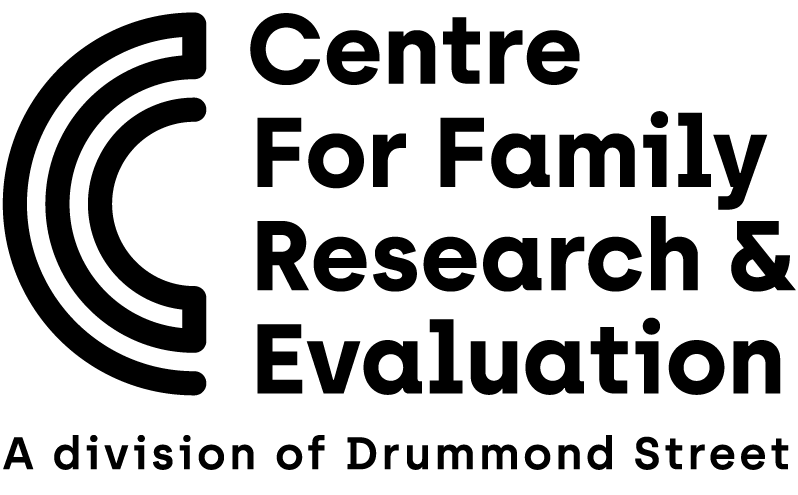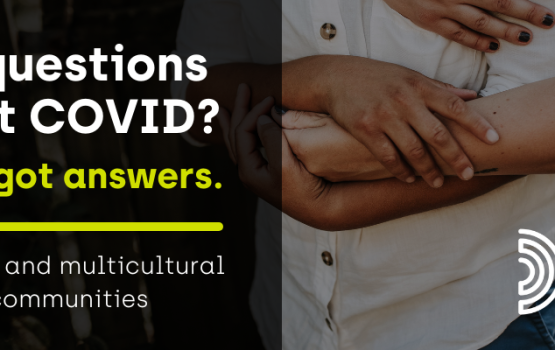Use the table of contents above to navigate on this page.
Updates to our factsheets and information sessions
January 2022: Advice continues to change regarding testing, including rapid antigen tests and when to get tested. For the latest advice, visit the Victorian Government’s webpage on COVID-19 testing.
December 2021: Children aged between 5 and 11 can get vaccinated from 10 January 2022. You can find out more on the Victorian Government’s webpage on vaccines for children and teenagers.
December 2021: You can find out more about booster vaccination doses – as well as third doses for severely immunocompromised or immunosuppressed people – on the Victorian Government’s webpage on who can get vaccinated (or ask your doctor or healthcare provider).
November 2021: Drummond Street’s pop-up vaccination clinic has ended but you can find out about safer, affirming vaccination sites for LGBTIQ+ people on the FabJab website.
October 2021: You can now get an International COVID-19 Vaccination Certificate to help you prove you have been fully vaccinated when you travel overseas.
Factsheets and information
Drummond Street Services, the Centre for Family Research and Evaluation and Queerspace have produced four COVID-19 factsheets for multicultural LGBTIQ+ communities, plus an Easy English version with key information from all four factsheets.
Information about COVID-19 in Easy English
You can find more resources on COVID-19 in Easy English on the Victorian Government’s webpage on COVID-19 for people with disability.
Factsheet: What do I need to know about getting vaccinated?
- English – PDF
- English (Screen reader accessible version) – DOCX
- Arabic (العربية) – PDF
- Simplified Chinese (简体中文) – PDF
- Traditional Chinese (繁體中文) – PDF
- Farsi (فارسی) – PDF
- French (Français) – PDF
- Malay (Bahasa Melayu) – PDF
- Spanish (Español) – PDF
- Tamil (தமிழ்) – PDF
Factsheet: What are my options to get vaccinated?
- English – PDF
- English (Screen reader accessible version) – DOCX
- Arabic (العربية) – PDF
- Simplified Chinese (简体中文) – PDF
- Traditional Chinese (繁體中文) – PDF
- Farsi (فارسی) – PDF
- French (Français) – PDF
- Malay (Bahasa Melayu) – PDF
- Spanish (Español) – PDF
- Tamil (தமிழ்) – PDF
Factsheet: What happens after I get vaccinated?
- English – PDF
- English (Screen reader accessible version) – DOCX
- Arabic (العربية) – PDF
- Simplified Chinese (简体中文) – PDF
- Traditional Chinese (繁體中文) – PDF
- Farsi (فارسی) – PDF
- French (Français) – PDF
- Malay (Bahasa Melayu) – PDF
- Spanish (Español) – PDF
- Tamil (தமிழ்) – PDF
Factsheet: How do I keep myself, my loved ones and my community safe?
- English – PDF
- English (Screen reader accessible version) – DOCX
- Arabic (العربية) – PDF
- Simplified Chinese (简体中文) – PDF
- Traditional Chinese (繁體中文) – PDF
- Farsi (فارسی) – PDF
- French (Français) – PDF
- Malay (Bahasa Melayu) – PDF
- Spanish (Español) – PDF
- Tamil (தமிழ்) – PDF
For more information
You can also find more information about COVID-19 on the Victorian Government’s Coronavirus website:
- Information in multiple community languages
- Information for LGBTIQ+ communities
- Information for people with disability (including information in Easy English)
Vaccination stories – Videos by community
Six members of multicultural LGBTIQ+ communities spoke with us about their experiences of COVID-19 and vaccination.
Arabic (العربية)
French (Français)
Japanese (日本語)
Mandarin Chinese (官话)
Spanish (Español)
Tamil (தமிழ்)
Information sessions
Over October and November, we also ran a series of free COVID-19 information sessions for multicultural LGBTIQ+ people. If you missed our information sessions, you can catch-up with our recorded session below.
If you have any questions after the session, please reach out to us by calling Drummond Street on 03 9663 6733 or emailing us at enquiries@ds.org.au.
Got more questions or concerns?
Drummond Street Services is here for you. Please get in touch with us either at enquiries@ds.org.au or call 03 9663 6733.
If you have any questions about this project, you can email cfre@ds.org.au.
How we developed our information sessions and factsheets
Community voices, needs and concerns have been at the heart of this project, and the project has been run by multicultural LGBTIQ+ people for multicultural LGBTIQ+ people.
Between August and October 2021, we engaged with multicultural LGBTIQ+ communities to develop resources that would be appropriate and would address community needs and concerns regarding COVID-19. This included:
- consulting with more than 20 community organisations and groups
- running a survey where 51 community members told us about their communities’ concerns
- running a focus group with community members to test our draft resources for relevance and usefulness.
We developed our information sessions and factsheets to address what we heard from community, together with information from Victoria’s Department of Health and Australia’s Department of Health.
Project acknowledgements
We would like to thank all our partners for their support towards developing and promoting this project:
- 1800 My Options
- 3CR Community Radio
- Aleph Melbourne
- Archer Magazine
- Asian Australian Rainbow Alliance (AAuRA) – a branch of Asian Australian Alliance (AAA)
- Asylum Seeker Resource Centre’s (ASRC) Gender Clinic
- Australian GLBTIQ Multicultural Council (AGMC)
- Centre for Culture, Ethnicity & Health
- cohealth’s Refugee and Asylum Seeker Health Service
- GLOBE
- Helem Melbourne
- JOY
- Many Coloured Sky
- Marhaba
- Meld Magazine
- Minus18
- Study Melbourne
- Switchboard
- The Institute of Many (TIM)
- Thorne Harbour Health
- Transgender Victoria
- Uniting Asylum Seeker Programs
- Yellow Kitties

